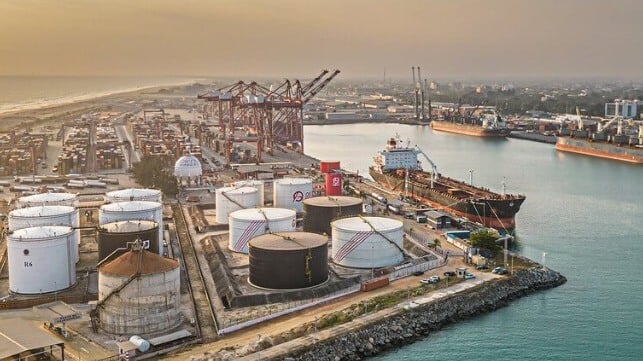Landlocked Niger with China’s Aid Starts Oil Exports with Pipeline to Benin

The government of the West African nation of Benin agreed to temporarily lift its blockade of Niger’s oil exports from its Port of Cotonou. While it represents a major advancement for the landlocked country’s ambitions, it is also seen as a win for China as it looks to develop its interests in Africa.
Benin’s Minister of Energy and Mines Samou Seidou Adambi said in a statement released last week, that his country will play its part in honoring all the agreements signed within the framework of the Niger-Benin pipeline project. This will be the maiden crude cargo of the newly commissioned Niger-Benin oil pipeline.
The first vessel, the one-million-barrel capacity tanker Front Cascade (157,500 dwt register in the Marshall Islands) had been waiting offshore near the terminal in Seme awaiting approval. AIS signals showed the vessel was permitted to dock and departed today, May 19.
China reportedly helped mediate the weeklong export impasse, with senior CNPC (China National Petroleum Corporation) executives alongside Chinese Foreign and Energy Ministries’ officials visiting Benin last week. Minister Adambi held a press briefing jointly with the Director General of the CNPC, Yuan Wenyuan.
“China is a great friend to Niger, we can never say it enough,” said Prime Minister and Minister of Economy and Finance Ali Mahaman Lamine Zeine. He was speaking when it was announced that China would be providing economic aid to the ruling junta that seized power in the country in 2023.
The Chinese-funded 1,240-mile oil pipeline is set to transform Niger into a major oil exporter in West Africa. Niger has been producing a paltry 20,000 barrels per day from its oil-rich Agadem Rift Basin, most of which was used domestically due to lack of an appropriate export infrastructure. However, the state-owned CNPC offered a $400 million loan, which among other things saw the revamp of the pipeline to its current capacity of 110,000 b/d. The pipeline connects Agadem Basin to storage tanks and loading platform at Benin’s Seme terminal.
The pipeline project has been locked in controversy since Niger’s coup d’état in July last year, leading to sanctions by West Africa’s economic bloc ECOWAS and western governments. ECOWAS has since lifted all its sanctions on Niger in an attempt to dissuade the country from permanently withdrawing from the bloc.

that matters most
Get the latest maritime news delivered to your inbox daily.
However, relations between landlocked Niger and its neighbor Benin have remained strained, culminating in the closure of the border between the two countries. Niger has justified the closure as based on security concerns. Niger accuses Benin of harboring French bases, which the Nigerien junta regards as a threat to their power. It is this border closure issue that saw Benin retaliate by blocking Niger’s oil exports through its ports.
China playing a role to mediate this impasse reveals its strong cooperation with Niger. It is also part of an aggressive move by China to increase its influence across the African continent while also expanding its sources of badly needed oil imports.
